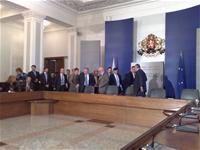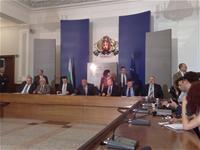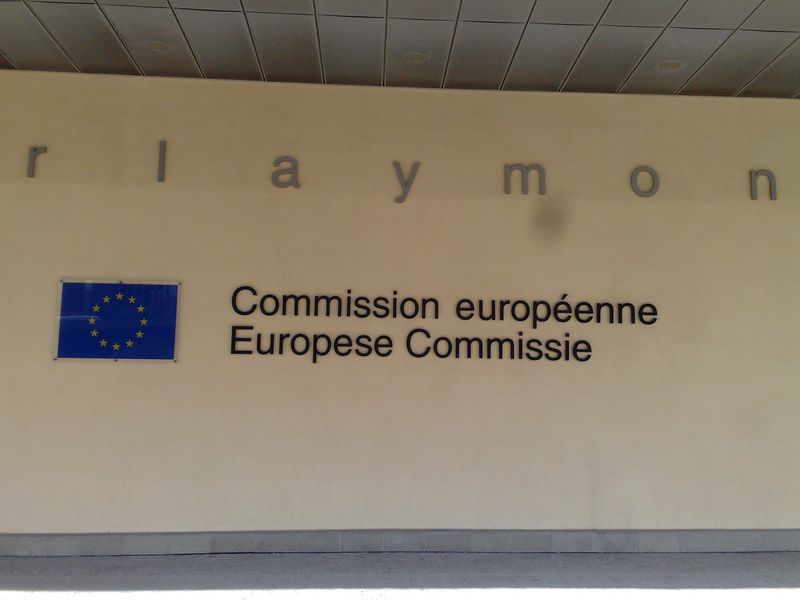Crisis weights and measures
Ralitsa Kovacheva, April 2, 2010
 60-50-8. These are not the measures of a newborn baby, but the balance of achievements of the National Council for Trilateral Cooperation (NCTC, where the government, the Trade Unions and the Business gather together). The finance minister Simeon Dyankov counted: 59 anti-crisis measures (plus one more added by the Government), adopted after 50 hours of discussions in 8 meetings. Only on coffee and water, paid by the Finance minister personally, the Prime Minister Boyko Borissov declared. He called the measures crisis ones, not anti-crisis measures, blaming the Trilateral council for not doing what's necessary an year ago.
60-50-8. These are not the measures of a newborn baby, but the balance of achievements of the National Council for Trilateral Cooperation (NCTC, where the government, the Trade Unions and the Business gather together). The finance minister Simeon Dyankov counted: 59 anti-crisis measures (plus one more added by the Government), adopted after 50 hours of discussions in 8 meetings. Only on coffee and water, paid by the Finance minister personally, the Prime Minister Boyko Borissov declared. He called the measures crisis ones, not anti-crisis measures, blaming the Trilateral council for not doing what's necessary an year ago.
Representatives of the government, the trade unions and the business invited the media early in the morning on Wednesday in the Council of ministers building, obviously impatient to announce the good news and their self-satisfaction. The chairman of the Confederation of Employers and Industrialists in Bulgaria (CEIBG) Ivo Prokopiev even pointed out, that “three days before Easter, the social dialogue in Bulgaria has resurrected”. The social partners expressed their enthusiasm from the “unprecedented” work within the NCTC, that had never before worked so intensely and so effectively, they said.
Within a few minutes of statements, which started with 20 minutes delay, it got clear that the journalists didn't share the enthusiasm of the officials. Nobody had the final version of the document, while still unapproved by the government, was obviously prepared for signing before the cameras. That prevented the journalists from asking concrete questions about the measures, and the timid attempts for questions got the usual answers about the difficult legacy of the previous government.
Asked by euinside if the implementation of the measures would proceed until the expected amount of 1.6 billion levs (0.82 mn euro) is collected, or longer, the Prime Minister said it depended on the country’s economic development.
According to CEIBG's Chairman Ivo Prokopiev, it is expected the three main measures to bring to the Treasury half a billion levs each: privatization, cutting down of public spending and selling CO2 emissions under the Kyoto Protocol.
The Finance Minister Simeon Dyankov additionally troubled the media,  announcing one more measure, not approved by the social partners, but for which the government insisted. According to the 60-th measure in case of illness, the first three days of the worker's sick leave would be paid by the employer (the first 2 days) and the third day would be paid by the worker himself, no matter that he had already paid his obligatory health securities to the National Social Security Institute. The minister explained this measure with the necessity to put an end of the abuses with the social security system. In practice, however, the worker would pay by himself for something that he had already paid for with his monthly obligatory payments.
announcing one more measure, not approved by the social partners, but for which the government insisted. According to the 60-th measure in case of illness, the first three days of the worker's sick leave would be paid by the employer (the first 2 days) and the third day would be paid by the worker himself, no matter that he had already paid his obligatory health securities to the National Social Security Institute. The minister explained this measure with the necessity to put an end of the abuses with the social security system. In practice, however, the worker would pay by himself for something that he had already paid for with his monthly obligatory payments.
The Minister of Labor and Social Policy Totyu Mladenov didn’t comment on this decision, but expressed his satisfaction that soup kitchens would to be kept, additional funding of 142 mn levs had been agreed for social aid and another 10 mn levs more for subsiding employment in rural areas. Which again comes to say that people who work hard, do not abuse with the social system and do not rely on social assistance are not a subject of special attention by the Bulgarian State.
Nevertheless, according to the the representatives of the trade unions and the employers, the measures distribute the burden of the crisis equally among all groups of people and leaves no one with privileges.
The Prime Minister promised the state to pay 550 billion levs to the business within 15 days through the Bulgarian Bank for Development. And vowed that if he failed to terminate contracts worth over 2 billion euro, concluded by the previous government, to raise VAT to 22 % (now it is 20%) without asking the social partners.
Asked by a journalist when the NCTC meetings would be made open for the media, like the Sofia municipal council meetings, the Prime Minister Boyko Borissov said: “Transparency is where I am”. And he promised if all participants in these meetings would agree, to provide technical possibility which would allow journalists to observe them on monitors.
The final list with the measures, approved by the government, is published on its website. It is final only for now, because the social partners will proceed with discussions on other measures. Among them - visions for pension and health reforms, which must be ready by the end of May. The anti-crisis package should be approved by the Parliament too.
 | © euinside
| © euinside | © euinside
| © euinside | © euinside
| © euinside